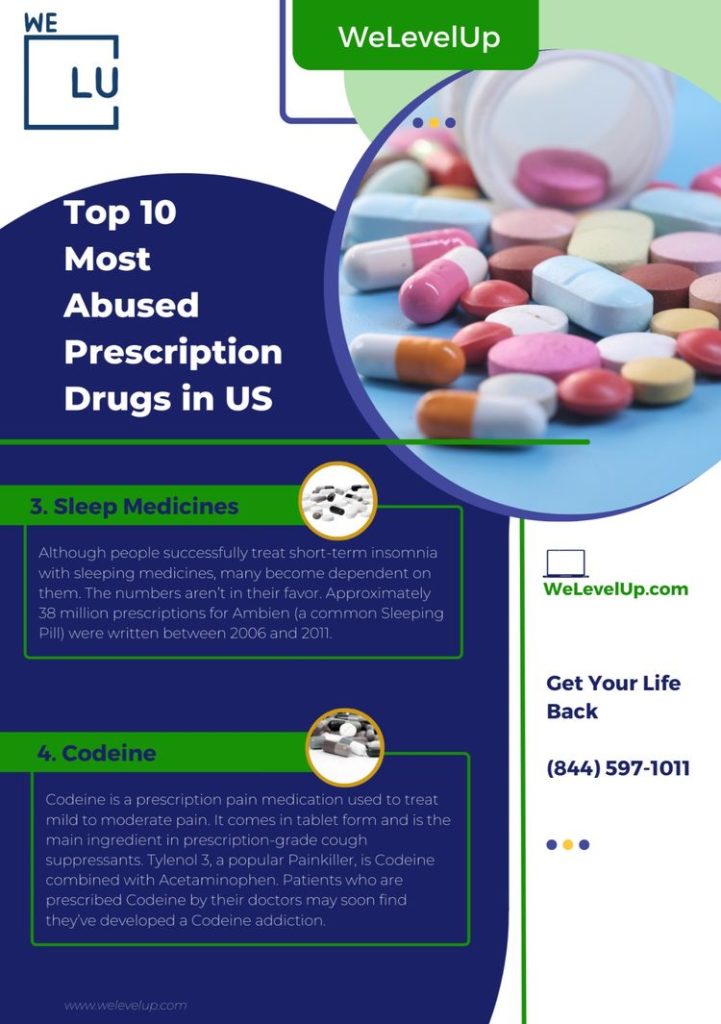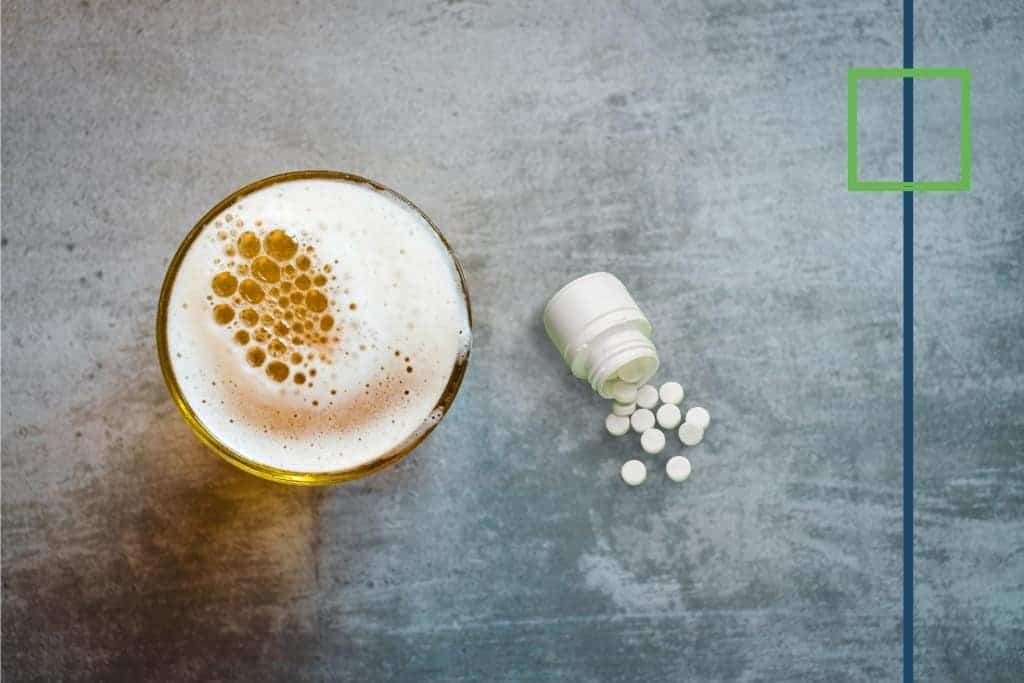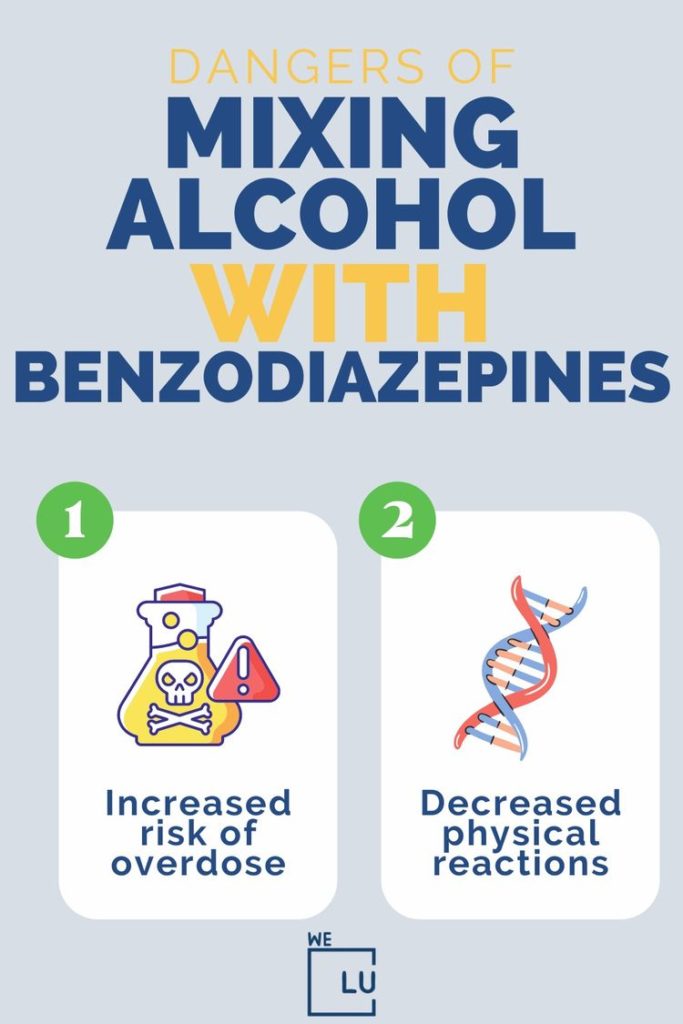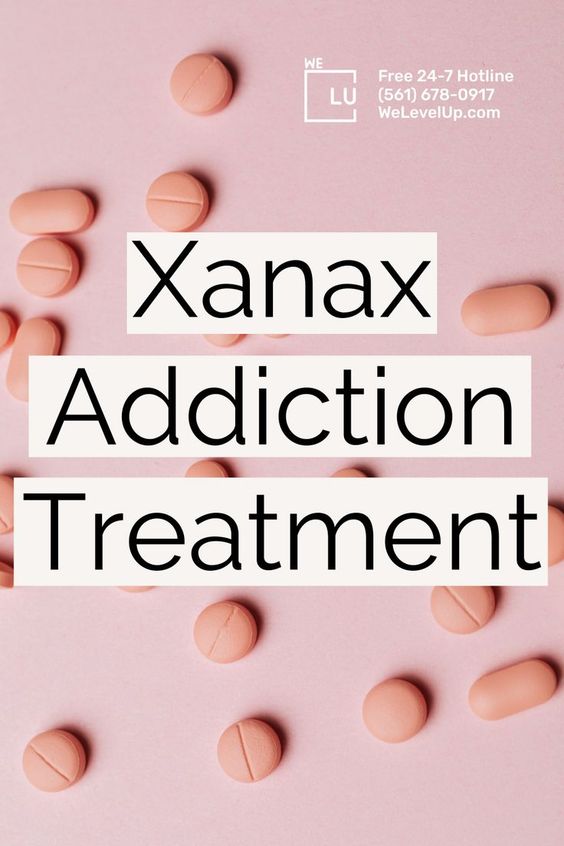Mixing Prescription Drugs With Alcohol Can Be Dangerous Because:
- It can lead to an overdose or death
- It can lead to toxic poisoning
- It can increase organ failure and more.
What Effect Does Drinking Alcohol and Taking a Prescription Drug Create?
Drinking alcohol while taking a prescription drug can have harmful effects. It can increase the amount of the drug in the body, leading to an overdose, and make the drug less effective, reducing its ability to be absorbed into the body. Additionally, it can cause reactions that may be serious and potentially life-threatening.
Mixing prescription drugs with alcohol can be dangerous because it can lead to severe reactions and even death. When mixing prescription drugs with alcohol, the active ingredients interact and create a combined substance that is unpredictable and potentially toxic. This increases the risk of an overdose or other serious health issues. In addition, mixing prescription drugs with alcohol impairs judgment, coordination, reflexes, mental clarity, and reaction time which can increase the risk of injury from accidents or falls. Furthermore, drinking alcohol while taking some medications may result in liver damage or other organ failures due to toxicity levels being too high for the body to handle. For these reasons, it’s important to avoid mixing prescription drugs with alcohol wherever possible. If you must take medication and plan on consuming alcohol afterward, make sure you speak to your doctor first and follow any instructions provided.
Alcohol and Prescription Drugs
Drinking alcohol while taking a prescription drug can have harmful effects. It can increase the amount of the drug in the body, leading to an overdose, and make the drug less effective, reducing its ability to be absorbed into the body. Additionally, it can cause reactions that may be serious and potentially life-threatening.CopyMoreReset
By understanding the dangers of mixing prescription drugs with alcohol, you can help reduce the risk of health complications or accidental injury. Always speak to your doctor about any potential risks before drinking alcohol when taking medication. With the right information and precautions, you can enjoy a safe experience with both substances.
It is also important to note that mixing prescription drugs and alcohol should be avoided while pregnant or breastfeeding. Some drugs may affect the unborn baby or the newborn baby. In addition, drinking alcohol while taking a prescription drug can make the drug less effective by reducing its ability to be absorbed into the body. For the safety of both you and your baby, it is important to talk to your doctor about avoiding mixing the two.
What Are Prescription Drugs?
Prescription drugs are a wide classification of medications that includes benzodiazepine (benzo) depressants, opioid painkillers, and amphetamine stimulants, among others. They can have a variety of uses, including relieving pain due to surgery or illness, helping calm anxiety, or maintaining impulse control. When used as directed, prescription drugs can effectively manage a variety of issues and ailments. However, when abused, they can often become addictive and dangerous, especially when combined with other substances like alcohol.
Prescription drug abuse is the use of prescription drugs in a way not intended by the prescribing doctor. It is a problematic use that includes everything from taking a friend’s prescription painkiller to snorting or injecting ground-up pills to get high. Prescription drug addiction involves people building a dependence on prescription pharmaceutical medications. In many cases, prescription drug abuse happens due to a voluntary pursuit of the euphoric feeling that some medications provide people.
Once prescription drug addiction sets in, abuse becomes compulsive and difficult to overcome. Additionally, addiction to prescription drugs can cause severe long-term consequences, including mental illness and physical injury while also affecting personal and professional relationships. Fortunately, there is a way for people to remove prescription drug addiction from their lives and overcome prescription drug abuse. Prescription drug abuse in older adults is a growing problem, especially when they combine drugs with alcohol. Having multiple health problems and taking multiple drugs can put people at risk of abusing drugs or becoming addicted.

Skip To:
Learn More:
- Benadryl And Alcohol
- Antibiotics And Alcohol
- Benzos and Alcohol
- Opioid Addiction Treatment
- Depressant Drugs Health Risks & Treatment
- Amphetamine Detox
- How To Clean Your System Of Alcohol in 24 Hours?
- Is Alcohol a Barbiturate?
- Bactrim And Alcohol
- Prescription Drug Abuse
- Prescription Pill Detox Program
- How Long Do Prescription Drugs Stay In Your System?
- Withdrawal Symptoms of Prescription Drugs
- 10 Most Abused Prescription Drugs In The US
What Happens When You Mix Prescription Drugs And Alcohol?
Mixing prescription drugs with alcohol can be harmful. Alcohol, like some medicines, can make you drowsy, sleepy, or lightheaded. Drinking alcohol while taking prescription drugs can intensify these effects. You may have trouble concentrating or performing mechanical skills. Small amounts of alcohol can make it dangerous to drive, and when you combine alcohol with certain prescription drugs, you put yourself at even greater risk.
Mixing prescription drugs with alcohol can lead to falls and serious injuries, especially among older people. If you or someone you know is struggling with a prescription drug and/or alcohol addiction, it’s essential to reach out for assistance. Inpatient addiction rehab provides treatment options for various substance use disorders, including those involving mixing alcohol and prescription drugs, and mental health.
When you receive prescription drugs, whether it’s a depressant like Xanax for anxiety treatment, an opioid painkiller like methadone for opioid withdrawal symptoms and addiction treatment, or a stimulant like Adderall for ADHD treatment, you’ll often find stringent warning labels about the risks of mixing prescription drugs with alcohol. When combined with the effects of alcohol, many otherwise routine prescription drugs can become deadly. Relaxing with a drink or two at night is dangerous when the effects of alcohol and prescription drugs are combined. Some people may use prescription drugs with alcohol to intensify the effects of both substances. This can lead to polysubstance abuse when the drugs are used together, especially in excess.

Get Your Life Back
Find Hope & Recovery. Get Safe Comfortable Detox, Addiction Rehab & Dual Diagnosis High-Quality Care.
Hotline(844) 597-1011What Happens When You Mix Prescription Drugs And Alcohol?
56% of U.S. adults over the age of 21 drink alcohol at least once per month. Drinking alcohol in moderation is a safe practice for millions of people. But about 16 million people in the U.S. struggle with alcohol use disorder. Problem drinking can take many forms, including dependence on drinking, drinking to extreme levels of intoxication, and mixing alcohol with prescription drugs or illegal drugs.
Unfortunately, prescription drug abuse is common in the U.S. Abuse includes mixing prescription drugs with alcohol to get high. Also, individuals who struggle with alcoholism and are prescribed medications may be unable to stop drinking while taking a prescription. If someone is struggling with alcohol use disorder, they can experience many adverse health consequences when they mix their legal prescription drugs with alcohol. Accidentally mixing prescription drugs with alcohol is risky enough, but some people struggle with addiction to prescription drugs and may mix these with alcohol.
Why is Mixing Prescription Drugs and Alcohol Dangerous?
Consuming prescription drugs and alcohol together can increase the amount of the drug in the body, which can result in an overdose.

Mixing Prescription Drugs With Alcohol Can Be Dangerous Because:
Alcohol and medications should never be mixed. Similar to other medications, alcohol might cause you to feel:
- tired,
- drowsy, or
- lightheaded.
While mixing prescription drugs with alcohol can be dangerous because it may amplify the above negative effects. You might have problems focusing or using your mechanical abilities. Driving while under the influence of alcohol can be risky, and the risk increases when you combine alcohol with several medications. Some medications can cause falls and serious injuries when used with alcohol, especially in elderly adults.
Why Can Mixing Prescription Drugs with Alcohol Be Dangerous?
One must realize that when someone mixes prescription drugs with alcohol, they can experience many different side effects, which can vary in intensity and danger.
- Alcohol can prevent some prescription drugs from working.
- Alcohol can raise the levels of drugs in the bloodstream to toxic levels.
The dangers of mixing prescription drugs with alcohol greatly outweigh the narrow, short-term benefits.
Mixing Prescription Drugs With Alcohol Can Be Dangerous Because Infographic

Mixing prescription drugs with alcohol can be dangerous because alcohol can increase the effects of the drug, or the drug can increase the effects of the alcohol. This can lead to dangerous side effects, damage to the organs, and even death in extreme cases. It is important to talk to your doctor about any prescription drugs you are taking and how it could interact with alcohol before consuming any.
Mixing Prescription Drugs With Alcohol FAQs
Why Is Mixing Prescription Drugs With Alcohol Dangerous?
Mixing prescription drugs with alcohol is dangerous because when certain drugs are taken with alcohol, these side effects can include headaches, dizziness, fainting, and loss of coordination. Additionally, it can increase your risk of experiencing internal bleeding, cardiac issues, and breathing difficulties. In addition to these risks, alcohol can alter the effects of a prescription, rendering it ineffective or even hazardous to your body.
What Are The Side Effects Of Mixing Prescription Drugs With Alcohol?
Mixing prescription drugs with alcohol might interact in unforeseen and undesirable ways.
When depressants (such Xanax and Valium) and alcohol are mixed, it can have hazardous and even fatal effects, including the quick onset of dizziness, stumbling, loss of sphincter control, memory loss, and even death.
When stimulants like Ritalin, Adderall, or Concerta are combined with alcohol, the effects of the alcohol are concealed, making it difficult for people to determine their level of intoxication. This can lead to overconsumption, which can lead to serious coordination and judgment problems, blackouts, passing out, and even death.
Alcohol and prescription opiates can cause delayed or halted respiration, reduced pulse and blood pressure, unconsciousness, coma, and even death. Examples of these medications include Vicodin, OxyContin, Tylenol 3 with codeine, and Percocet.
Who Is Most At Risk For Mixing Prescription Drugs With Alcohol?
The risk factors for mixing the prescription drug with alcohol abuse included the following:
- Being young, between the ages of 18 and 25.
- Not graduating from high school.
- Being single
- Having a pattern of heavy drinking or binge drinking behaviors.
People who struggle with alcohol dependence and addiction, and also need to take prescription medications need treatment for alcohol use disorder and alcohol withdrawal symptoms. Continuing to drink while taking prescription drugs for various health problems can worsen health outcomes, and patients can risk dangerous side effects when mixing prescription drugs with alcohol.
Mixing Alcohol With Other Drugs Can Cause
Alcohol often has harmful interactions with prescription drugs, over-the-counter drugs, and even some herbal remedies. Alcohol interactions with medications may cause problems such as:
- Nausea and vomiting
- Headaches
- Drowsiness
- Dizziness
- Fainting
- Changes in blood pressure
- Abnormal behavior
- Loss of coordination
- Accidents
Mixing prescription drugs with alcohol may increase the risk of complications such as:
- Liver damage
- Heart problems
- Internal bleeding
- Impaired breathing
- Depression
- Alcohol poisoning and overdose
In some cases, alcohol interactions may decrease the effectiveness of medications or render them useless. In other cases, alcohol interactions may make drugs harmful or even toxic to the body. Even in small amounts, alcohol also may intensify prescription drug side effects such as drowsiness, sleepiness, and light-headedness, which may interfere with your concentration and ability to drive a vehicle or operate machinery, and lead to serious or even fatal accidents. Because alcohol can adversely interact with hundreds of commonly used medications, it’s important to observe warning labels and ask your doctor or pharmacist if it’s safe to use alcohol with any medications and herbal remedies that you take.
Get Help. Get Better. Get Your Life Back.
Searching for Accredited Drug and Alcohol Rehab Centers Near You?
Even if you have failed previously and relapsed, or are in the middle of a difficult crisis, we stand ready to support you. Our trusted behavioral health specialists will not give up on you. When you feel ready or just want someone to speak to about therapy alternatives to change your life call us. Even if we cannot assist you, we will lead you to wherever you can get support. There is no obligation. Call our hotline today.
(844) 597-1011What Prescription Drugs Should Someone Never Mix With Alcohol?
Mixing prescription drugs with alcohol may seem like no big deal, but mixing the two can often be very dangerous. If you’ve been prescribed medication and aren’t sure if it’s okay to drink that red wine, you might want to think twice about hitting the bottle. There are more than 100 medications that can cause issues when mixed with alcohol.

Mixing prescription drugs with alcohol can include symptoms that range from something as minor as nausea to more serious complications, like stomach bleeds, organ damage, difficulty breathing, and even death. One study from the National Institutes of Health (NIH) found that 42 percent of individuals who drink alcohol were taking medication that could negatively react to the drink.
So how do you know what is dangerous to mix with alcohol and what’s not? Here’s a list of medications that should never be mixed with alcohol, along with some of the possible health risks. It should be noted that the risks vary based on the exact type of medication.
While moderate alcohol use (less than one drink per day) may be good for the heart, consuming any alcohol at all while taking the following popular medications carries a very significant risk:
- Painkillers
- Antidepressants and mood stabilizers
- Anti-anxiety and sleeping pills
- Antibiotics
- ADHD medications
- Diabetes medications
- Nitrates and other blood pressure drugs
- OTC cold and flu treatments
- Coumadin
- Erectile dysfunction medications
Mixing Prescription Drugs With Alcohol – Anxiety Meds Such As Xanax, Valium, & Trazodone
Alcohol and anxiety problems are common co-occurring disorders that can cause severe distress and impair your daily life. Anxiety and alcohol abuse often make each other significantly worse. Alcoholism can exacerbate an existing anxiety disorder or may lead to new anxiety symptoms and vice versa. This means that a pre-existing anxiety disorder can contribute to alcoholism (as many people use alcohol as an unhealthy coping mechanism).
Alcohol and anxiety meds are especially dangerous when combined. Problem drinkers were 1.5 times more likely to drink and use anxiety meds. Interestingly, problem drinking among women is linked with anxiety meds use. Xanax is a prescription drug used for anxiety treatment. It is also sometimes prescribed for panic attack treatment. Taking Xanax and alcohol together will intensify the effects of both substances. Combing Xanax and alcohol increases the likelihood of a Xanax overdose, which can lead to respiratory depression, seizures, and potentially even death.
Trazodone is an FDA-approved antidepressant for treating major depressive disorders. Trazodone has a possibility for physical dependence when consumed with alcohol. In addition to that, the deadly combination of Trazodone and alcohol can lead to delirium, hallucinations, and seizures in extreme cases. Mixing Trazodone and alcohol can lead to severe side effects that affect a person’s overall health.
Valium (diazepam) is a benzodiazepine prescribed for anxiety, muscle spasms, seizures, and insomnia. While some users mix Valium and alcohol or other drugs to intensify their calming effects, others take Valium with other substances without being aware that they are endangering their health and safety. Abusing this medication by mixing it with other medicines, illicit drugs, or alcohol poses serious risks. In order to prevent excessive sedation, it is critically important to be aware of the possible interactions of Valium with other chemicals.
Risks include:
- Drowsiness
- Dizziness
- Risk of overdose
- Risk of high blood pressure/heart attack
- Breathing difficulty
- Impaired motor control
- Liver damage
- Memory problems and unusual behavior
Mixing Prescription Drugs With Alcohol – Antihistamines Such As Benadryl
Benadryl (diphenhydramine) is a brand name for an over-the-counter (OTC) medication that’s classified as an antihistamine. People who are addicted to Benadryl often have simultaneous addictions to alcohol and other drugs. Both Benadryl and alcohol are classified as CNS depressants. First-generation antihistamines will cause drowsiness in just about everybody and alcohol does that too, so if someone is taking alcohol and antihistamines the chance of having a double dose of that drowsiness are very, very high. Depression of the central nervous system (CNS) can cause a slower rate of breathing, decreased heart rate, and loss of consciousness, and can lead to a coma in rare cases.
Risks include:
- Drowsiness
- Dizziness
- Increased overdose risk
Mixing Drugs With Alcohol – Antibiotics
The advice that you shouldn’t mix antibiotics and alcohol does hold true for a small group of anti-infective drugs, including metronidazole (Flagyl, Metronide, or Metrogyl), tinidazole (Fasigyn or Simplotan), and sulfamethoxazole/trimethoprim (Bactrim, Co-trimoxazole). The side effects of both Bactrim and alcohol are similar, including, stomach upsets, dizziness, and drowsiness. Mixing Bactrim and alcohol can increase the side effects of both, making the person extremely uncomfortable.
Risks include:
- Increased heart rate
- Sudden changes in blood pressure
- Stomach pain
- Vomiting
- Headache
- Liver damage and reduced effectiveness
First-class Facilities & Amenities
World-class High-Quality Addiction & Mental Health Rehabilitation Treatment
Rehab Centers TourRenowned Addiction Centers. Serene Private Facilities. Inpatient rehab programs vary.
Addiction Helpline(844) 597-1011Proven recovery success experience, backed by a Team w/ History of:
15+
Years of Unified Experience
100s
5-Star Reviews Across Our Centers
10K
Recovery Success Stories Across Our Network
- Low Patient to Therapist Ratio
- Onsite Medical Detox Center
- Comprehensive Dual-Diagnosis Treatment
- Complimentary Family & Alumni Programs
- Coaching, Recovery & Personal Development Events
Mixing Drugs With Alcohol – ADHD Medications Such As Adderall & Ritalin
Adderall is a brand name for the combination of dextroamphetamine and amphetamine. It is prescribed for attention deficit hyperactivity disorder treatment and narcolepsy (sleep disorder). Some people think that taking Adderall before drinking will help them keep up their energy. If Adderall stimulates them up and alcohol makes them tired, they should balance each other out, right? But that is not the case. Young people intentionally mix alcohol and Adderall in order to party longer and drink larger amounts. Unfortunately, this practice is extremely risky and dangerous because it can result in potentially-fatal consequences, including anxiety, depression, seizures, alcohol poisoning, and even heart attack.
Ritalin. or Methylphenidate hydrochloride—the generic for Ritalin, is a stimulant prescribed for ADHD treatment. It affects the parts of the brain and central nervous system (CNS) that control impulses and hyperactivity. Using Ritalin with alcohol also increases your risk of alcohol poisoning. This is because Ritalin masks the CNS-depressing effects of alcohol. You may feel more alert and be less likely to realize when you’ve had too much alcohol.
People who are addicted to Ritalin and alcohol typically experience alcohol and Ritalin withdrawal symptoms when they stop using the substances. They may feel severely depressed or irritable and suffer from headaches. They may need higher doses or more drinks to feel the same effects as they once did because frequent use increases a person’s tolerance.
Risks include:
- Dizziness
- Drowsiness
- Impaired concentration
- Possible heart or liver damage
Mixing Prescription Drugs With Alcohol – Blood Pressure Drugs
Risks include:
- Drowsiness
- Heart problems such as arrhythmia
- Dizziness
- Fainting
Mixing Prescription Drugs With Alcohol – Blood Thinners
Risks include:
- Internal bleeding or an increased risk of blood clots
- Stroke or heart attack
Mixing Prescription Drugs With Alcohol – Cholesterol Drugs Such As Lipitor
Risks include:
- Liver damage
- Increased flushing and itching
- Increased stomach bleeding
Mixing Prescription Drugs With Alcohol – Cough Medicine
Cough medicine is commonly available in local pharmacies as an over-the-counter (OTC) flu remedy. It helps us to relieve discomfort when suffering from flu, like runny nose and cough. Sadly, it is also a popular drug choice by substance abusers. It can be regarded as cough medicine abuse when cough syrup is used not for flu remedy or using more than what is prescribed by the doctor. Dextromethorphan is a cough expectorant and suppressant found in many OTC cough medicines. Dextromethorphan or DMX causes side effects such as nausea, vomiting, panic attacks, seizures, pounding heartbeat, high blood pressure, slurred speech, and even death if abused with alcohol or other drugs.
Risks include:
- Drowsiness
- Dizziness
- Increased risk for overdose
Mixing Prescription Drugs With Alcohol – Prescription Opioid Pain Relievers Such As Vicodin Or Percocet
Percocet is a prescription painkiller containing oxycodone (a semi-synthetic opiate) and acetaminophen (the active ingredient in Tylenol). This is a strong pain reliever most often prescribed for intense, short-term pain after surgery or trauma, but it is also sometimes used for clients with severe chronic pain. A high enough dose can result in a sense of euphoria similar to that experienced by heroin users. Abuse can lead to Percocet Addiction or something harder. Alcohol can intensify the Percocet side effects, but taking Percocet and alcohol together makes it more likely that the user will experience an overdose and stop breathing.
Vicodin is a prescription painkiller to relieve moderate to severe pain. Vicodin can be addictive, and some individuals build a tolerance for it. This means that the person takes larger doses of this drug or does so compulsively without stopping. Physical dependence means that the person will experience withdrawal symptoms when they stop taking the medication. This can be dangerous because Vicodin can be highly addictive, and overdoses and death are common.
Mixing alcohol and Vicodin can cause extreme dizziness or drowsiness. Drinking alcohol while using Vicodin can be very dangerous to a person’s liver health because both alcohol and acetaminophen (one of the active components of Vicodin) are both metabolized through the liver. Both hydrocodone and acetaminophen can cause liver damage and liver failure when abused alone. However, when used together, the consequences on the liver could turn deadly.
Risks include:
- Drowsiness
- Dizziness
- Increased risk for overdose, slowed or difficulty breathing, impaired Motor control
- Unusual behavior and memory problems
Mixing Prescription Drugs With Alcohol – Over-The-Counter Pain Relievers Such As Tylenol
Acetaminophen, the active ingredient in Tylenol, is a particularly bad medication to mix with alcohol, as it can lead to liver damage. Other risks include upset stomach, bleeding and ulcers, and rapid heartbeat. Acetaminophen, the active ingredient in Tylenol, is a particularly bad medication to mix with alcohol, as it can lead to liver damage. Other risks include upset stomach, bleeding and ulcers, and rapid heartbeat. Large doses or chronic use can lead to liver damage, especially when used in combination with alcohol or other drugs. If a person who is abusing acetaminophen suddenly stops misusing the drug, withdrawal symptoms can occur. These withdrawal symptoms may range from bone and muscle pain and restlessness to diarrhea and vomiting.
World-class, Accredited, 5-Star Reviewed, Effective Addiction & Mental Health Programs. Complete Behavioral Health Inpatient Rehab, Detox plus Co-occuring Disorders Therapy.
CALL(844) 597-1011End the Addiction Pain. End the Emotional Rollercoaster. Get Your Life Back. Start Drug, Alcohol & Dual Diagnosis Mental Health Treatment Now. Get Free No-obligation Guidance by Substance Abuse Specialists Who Understand Addiction & Mental Health Recovery & Know How to Help.
Dual Diagnosis Treatment For Polysubstance Abuse
Mixing prescription drugs with alcohol can lead to addiction and dangerous side effects, including a greater risk of overdose. People with a history of problem drinking and alcohol dependence will need to inform their doctor about these problems. In addition, it’s crucial that these individuals get help from a qualified addiction rehabilitation center.
Polysubstance abuse is the consumption of more than one substance at the same time. While some drug users have a preferred drug, other users have several drugs they like to take. Polysubstance abuse is common, and these drug users are clinically classified as having multiple comorbid substance disorders.
Because withdrawal from multiple substances is more complicated than withdrawal from one substance, inpatient medical detox is generally recommended. The goal of treatment is to restore some or all normal functioning of the liver by addressing the underlying issue of alcohol and prescription drug abuse.
Medically Assisted Detox
Usually, the first step in inpatient alcohol treatment is medically assisted detox. Doctors and addiction specialists monitor clients’ vital signs while alcohol exit the system. Depending on the type of substance a person is detoxing from, withdrawal symptoms may differ.
Cravings are very common during detox and can be challenging to overcome. This often leads to relapse. Constant medical care provided during inpatient treatment helps prevent relapse. Clinicians can provide necessary medicine and medical expertise to lessen cravings and withdrawals.
Behavioral Therapies, Dual Diagnosis
Cognitive Behavioral Therapy (CBT) and Dialectical Behavioral Therapy (DBT) can improve the behavior of the individual. CBT targets negative and maladaptive thought patterns as it promotes positive emotions and beliefs, while DBT helps clients address conflicting impulses so they can make healthy choices. Both therapies treat substance abuse, anxiety disorders, and other mood issues. Therapy also empowers clients to identify, avoid and mitigate cues that trigger drug cravings.
Individual And Group Counseling
Alcoholism and mental health counseling occur in both individual and group settings. One-on-one treatment sessions may address unresolved trauma, unconscious conflicts, and specific struggles, while group sessions often involve training in life skills, stress management, conflict resolution, and social connections. Group counseling also gives clients the chance to share their thoughts and experiences to develop social support, which is essential for lasting recovery.
During your rehabilitation, the staff from the We Level Up treatment facility will help you identify what caused your alcoholism and teach you skills that will help you change your behavior patterns and challenge the negative thoughts that led to your alcoholism. Sometimes, the pressures and problems in your life lead you to rely on alcohol to help you forget about them momentarily.
Please, do not try to detox on your own because the alcohol detox process can be painful and difficult without medical assistance. In addition, it’s crucial that these individuals get help from a qualified addiction rehabilitation center.
We Level Up Treatment Center provides world-class care with round-the-clock medical professionals available to help you cope. We work as an integrated team providing support through alcohol detox and other aspects of treatment. Make this your opportunity to reclaim your life. Our specialists know what you are going through and will answer any of your questions. If you or someone you care about is struggling with alcohol or prescription medication addiction, please reach out to a drug abuse counselor today to explore your treatment options. Call us today here at We Level Up to get into proper treatment. Above all, recovering from a substance use disorder does not need to be overwhelming or burdensome.

Experience Transformative Recovery at We Level Up Treatment Centers.
See our authentic success stories. Get inspired. Get the help you deserve.
Start a New Life
Begin with a free call to an addiction & behavioral health treatment advisor. Learn more about our dual-diagnosis programs. The We Level Up Treatment Center Network delivers recovery programs that vary by each treatment facility. Call to learn more.
- Personalized Care
- Caring Accountable Staff
- World-class Amenities
- Licensed & Accredited
- Renowned w/ 100s 5-Star Reviews
We’ll Call You
Sources:
[1] NIDA – https://teens.drugabuse.gov/drug-facts/prescription-drugs
[2] NIDA – https://archives.drugabuse.gov/news-events/nida-notes/2008/03/alcohol-abuse-makes-prescription-drug-abuse-more-likely
[3] NCBI – https://www.ncbi.nlm.nih.gov/pmc/articles/PMC6761694/
[4] NIAAA – https://www.niaaa.nih.gov/publications/brochures-and-fact-sheets/harmful-interactions-mixing-alcohol-with-medicines
National Institute on Alcohol Abuse and Alcoholism. – Harmful Interactions: Mixing Alcohol and Medications.
Weathermon R, Crabb DW. – Alcohol and medication interactions. Alcohol Res Health. 1999;23(1):40‐54.
Wagner E, Hospital M, Sobell M, Sobell L. – Adult Psychopathology and Diagnosis. (Beidel D, Frueh C, Hersen M, eds.). Hoboken, NJ: John Wiley & Sons; 2014:657.
University of Rochester Medical Center. – Alcohol and Older Adults.
Finnell J. – Rosen’s Emergency Medicine – Concepts and Clinical Practice E-Book. 8th ed. (MJ, Hockberger R, Walls R, eds.). Elsevier Health Sciences; 2013:2391.
Mergenhagen KA, Wattengel BA, Skelly MK, Clark CM, Russo TA. – Fact versus fiction: A review of the evidence behind alcohol and antibiotic interactions. Antimicrob Agents Chemother. 2019;64(3). doi:10.1128/AAC.02167-19


